| Srl | Item |
| 1 |
ID:
140931
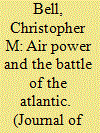

|
|
|
|
|
| Summary/Abstract |
The prioritization of strategic bombing over trade defense by the British Air Ministry, Bomber Command, and Winston Churchill did not delay the acquisition of Very Long Range aircraft to close the Atlantic “air gap” until May 1943. The Royal Air Force’s Coastal Command possessed enough aircraft to provide air cover in the mid-Atlantic sooner than it did. The Admiralty and Coastal Command were slow to identify the need for land-based air cover in the mid-Atlantic because the U-boat threat did not develop there until mid-1942, because they expected escort carriers to provide a solution, and for technical and doctrinal reasons.
|
|
|
|
|
|
|
|
|
|
|
|
|
|
|
|
| 2 |
ID:
087856
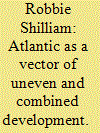

|
|
|
|
|
| Publication |
2009.
|
| Summary/Abstract |
The conversation between Alex Callinicos and Justin Rosenberg broaches an issue that is central to any sociological approach to the subject matter of international, namely, the extent to which analogies drawn from 'society'-understood as an endogenous entity-can be used to explain inter-societal phenomena. So far, the debate has focused analytically primarily upon the relationship between class conflict and geopolitics, and has exhibited a substantive focus primarily upon European history. The contribution of this article to the debate is to problematize both these foci. I suggest that Atlantic slavery and the racialization of New World identity might be the fundamental vector through which to explore the special quality of international sociality in the making of the modern world.
|
|
|
|
|
|
|
|
|
|
|
|
|
|
|
|
| 3 |
ID:
070006
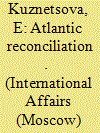

|
|
|
| 4 |
ID:
096989
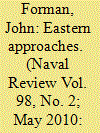

|
|
|
| 5 |
ID:
097261


|
|
|
|
|
| Publication |
2010.
|
| Summary/Abstract |
Euro-Atlantic" as a political power brand name was employed possibly for the first time in a 1985 speech by Bettino Craxi, then president of the European Council, when he spoke about "Italy's Euro-Atlantic role." Its political usage was codified in the label Euro-Atlantic Partnership Council (EAPC), a group formed in 1997 and which now numbers fifty "partner" governments. EAPC is the successor to the North Atlantic Cooperation Council. (The NACC was created as an adjunct to NATO six years earlier in the first flush of post-Cold War Europe.) Among EAPC partners are not only eleven far-flung (and non-Atlantic-riparian) governments of the former Soviet Union-from Armenia to Uzbekistan-but also the six republics of the former Yugoslavia. Russia itself is listed among the partners, although its leaders remain highly suspicious of the NATO parent.
|
|
|
|
|
|
|
|
|
|
|
|
|
|
|
|
| 6 |
ID:
166448
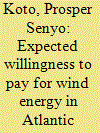

|
|
|
|
|
| Summary/Abstract |
We investigate the demand-side of wind energy in three provinces in Atlantic Canada, including New Brunswick, Nova Scotia and Prince Edward Island. Empirical questions addressed include: (i) What are the determinants of the probability of paying a non-zero premium for electricity generated using wind technology?; (ii) Given participation, what drives how much more households are willing to pay a month, and what is the monthly premium or expected willingness-to-pay (WTP)?; and (iii) Is there heterogeneity in the expected WTP? The study design follows the contingent valuation framework and the survey questionnaire follows a payment-scale format, reducing the starting point bias and reduces the incidence of item non-response. The data is from a stratified random sample. We employ two-stage models, Cragg's hurdle and the two-part econometric models in the analysis. Scope and 0 WTP effects are explicitly explored. We find that the overall probability of participation is 0.73. University education, income, residential property ownership, concerns about the presence of wind turbines in neighborhoods, and externality affect the likelihood of participation. Households are willing to pay 14% more per month in energy bill for wind power. There is evidence of scope sensitivity. The results provide insights on what proportion of the population will participate and how much more they are willing to pay for wind energy.
|
|
|
|
|
|
|
|
|
|
|
|
|
|
|
|
| 7 |
ID:
092954
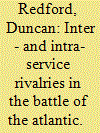

|
|
|
|
|
| Publication |
2009.
|
| Summary/Abstract |
This article considers disputes the Royal Navy and Coastal Command had with Bomber Command, the Air Staff and supporters of strategic bombing over what was the 'proper' use of air power. The disputes centred on the provision of air support for the anti-submarine campaign in the Battle of the Atlantic. This article will argue that the balance was too much in favour of strategic bombing at the expense of the security of the Atlantic convoys, but that when corporate culture and grand strategy are considered, the reasoning behind such an imbalance becomes easier to comprehend.
|
|
|
|
|
|
|
|
|
|
|
|
|
|
|
|
| 8 |
ID:
113539
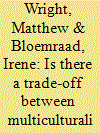

|
|
|
|
|
| Publication |
2012.
|
| Summary/Abstract |
Across immigrant-receiving democracies on both sides of the Atlantic, policies of "cultural recognition" (e.g., "multiculturalism") have become a convenient punching-bag for political elites. Among academics, heated theoretical debates exist over whether such policies foster or hinder immigrants' engagement with their adoptive nation. We provide a novel empirical assessment of this debate from the immigrant perspective. We ask how multicultural and citizenship policies influence immigrants' socio-political engagement with their adoptive nation in three realms: social inclusion, political inclusion, and political engagement. Using a variety of cross-national and single-country surveys, we show that multiculturalism in no case hinders engagement with society and government, and in many cases seems to foster it. Thus, the claim that multiculturalism undermines immigrants' socio-political integration appears largely without foundation.
|
|
|
|
|
|
|
|
|
|
|
|
|
|
|
|
| 9 |
ID:
129017
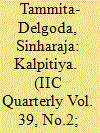

|
|
|
| 10 |
ID:
145945
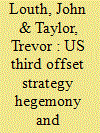

|
|
|
|
|
| Summary/Abstract |
The US third offset strategy (3OS) may transform the way in which Western powers generate future battle-winning capabilities and the technologies that enable and sustain them. In this article, John Louth and Trevor Taylor explore the nature of the 3OS, the strategic thinking that is driving it forward and the ambitions it seeks to satisfy. They discuss the key technologies within the strategy and explore the impact that their emergence will have on allies of the US. They conclude by discussing the opportunities and challenges presented to decision-makers on both sides of the Atlantic.
|
|
|
|
|
|
|
|
|
|
|
|
|
|
|
|